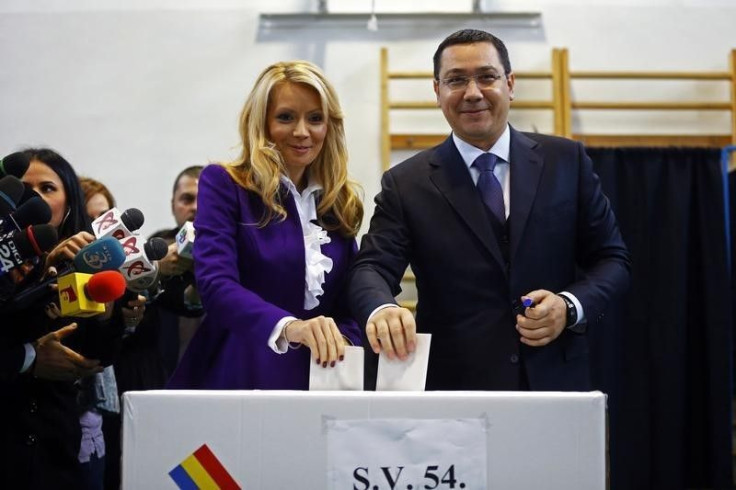Romania's Ponta In Driving Seat In Presidential Polls

Update 7:15 p.m. EST: BUCHAREST (Reuters) - Romania's leftist Prime Minister Victor Ponta led the first round of a presidential election on Sunday, partial results showed, beating his nearest challenger, an ethnic German mayor backed by two centre-right parties.
Ponta was ahead with 37.5 percent of the vote, compared to his main rival Klaus Iohannis on 30.3 percent, with votes at 17 percent of polling stations counted. The result, which reflected exit polls released on Sunday evening, means the two would compete in a run-off due on Nov 16.
Original post:
BUCHAREST (Reuters) - Romanians seem likely to propel Prime Minister Victor Ponta into the presidency in elections that began on Sunday, consolidating his leftist Social Democrat party's hold on power, but raising questions about judicial independence.
A former prosecutor and amateur rally driver who became the European Union's youngest prime minister two years ago, Ponta is expected to win the first round in a field of 14 candidates, but not by enough to avoid a run-off on Nov 16.
A Ponta presidency could bring more stability to one of Europe's poorest countries, which endured a painful recession and cuts during the global slowdown and has made mixed progress in implementing economic reforms under an IMF-led aid deal.
As prime minister, Ponta feuded often with his bitter rival, outgoing President Traian Basescu, which stymied policymaking.
"I want a president that is young and capable and I want him to not fight with everybody like Basescu is doing," said Elena Popa, 32, a shop seller in the capital Bucharest.
Ponta's attempt to impeach Basescu in a 2012 national referendum drew sharp criticism from the EU and sent the leu currency to record lows.
"Investors are very wary of Romanian politics causing selloffs in the currency," said Demetrios Efstathiou, the head of CEEMEA Strategy, Global Markets, at Standard Bank Plc.
"If investors feel that political risk in Romania is coming down, then it's possibly the elimination of the biggest risk for investors. So Ponta coming to power, his party controlling (parliament), I think it will be seen as positive not negative."
More than 18 million Romanians are eligible to vote in Sunday's election, for which the exit polls are due at 1900 GMT.
The Social Democrats, heirs to the Communists whose single-party rule was toppled in a 1989 revolution, have courted voters by restoring some of the pensions and wages for state workers cut under Ponta's predecessor. Ponta has pledged to hike pensions again next year, has cut value added tax on items such as bread, and cut an employment tax.
But his campaign was hit by setbacks as well. Basescu accused Ponta of spying for the foreign intelligence service in the 1990s - a charge Ponta's camp rejected as a political smear. Ponta's father-in-law and other ruling party politicians were also hit by graft allegations in the last weeks of the campaign.
Romania joined the European Union in 2007 but remains its second poorest and one of its most corrupt member states. It has struggled to absorb EU development funds needed for example to fix a shoddy road network, tax evasion is rife and 40 percent of households don't have indoor bathrooms.
"I am fed up with politicians and their corruption," Marin Tudose, a 48-year-old dye maker, who will vote for a right-wing candidate. "When will we start to live better? Because so far it hasn't happened for me."
LEADING OPINION POLLS
Without the check on power hitherto provided by Basescu, Ponta's rise has raised concerns he might tighten control over the judiciary and anti-corruption prosecutors.
Ponta rebuffed EU criticism in 2012 that he did not appear to respect the rule of law and democratic institutions, denying allegations that he put pressure on judges.
Ponta, and the new government he would help shape, might loosen fiscal policy and end the deal with the International Monetary Fund. The 4 billion euro agreement expires next year, has bolstered Romania's credibility with investors and nudged successive governments to reform.
"I think that from this winter we will truly be a democratic country, a European country and that after 10 years of war and destruction we can begin to build and ... rebuild," Ponta said while voting in Bucharest, with a final dig at the incumbent.
Ponta has consistently led opinion polls over his nearest rival, the ethnic German mayor Klaus Iohannis, who is credited with transforming the Transylvanian city of Sibiu and is backed by two center right parties.
Such was his lead that Ponta in August said he would sit back with popcorn and watch the other candidates debate.
The president of the Black Sea country of 20 million people carries out ceremonial duties but he also exerts influence on the executive, appointing the new prime minister, judges and prosecutors, and can stall government policy proposals. It is unclear at this stage whom Ponta might choose as a successor as prime minister if he wins.
"After the IMF agreement expires there will be two questions - will it be further extended?" Greg Konieczny, the manager of Romanian investment fund Fondul Proprietatea, said in a recent interview. "But that will be a decision for the new government. And second, if it is not extended, then will the government keep behaving in a responsible way?"
© Copyright Thomson Reuters 2024. All rights reserved.





















